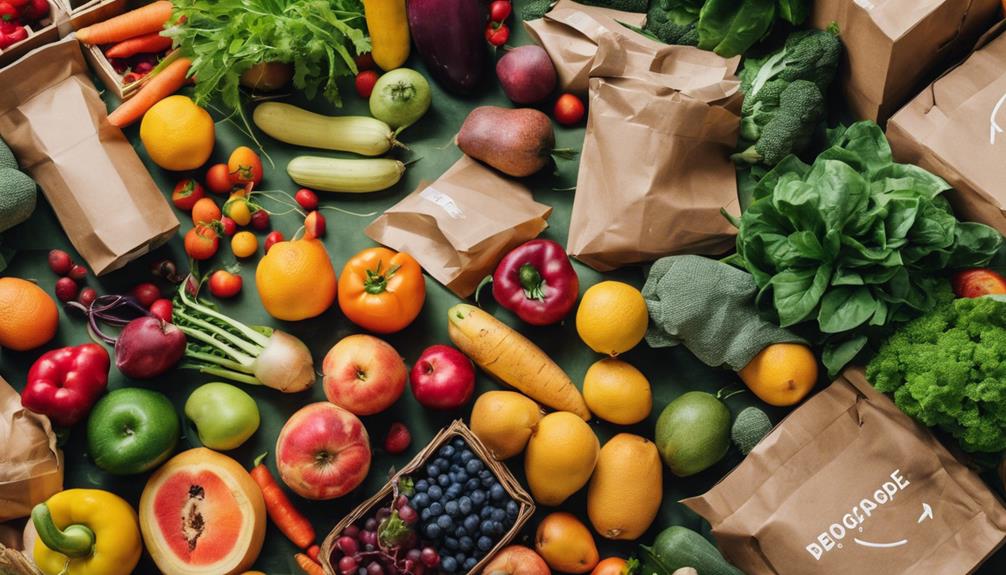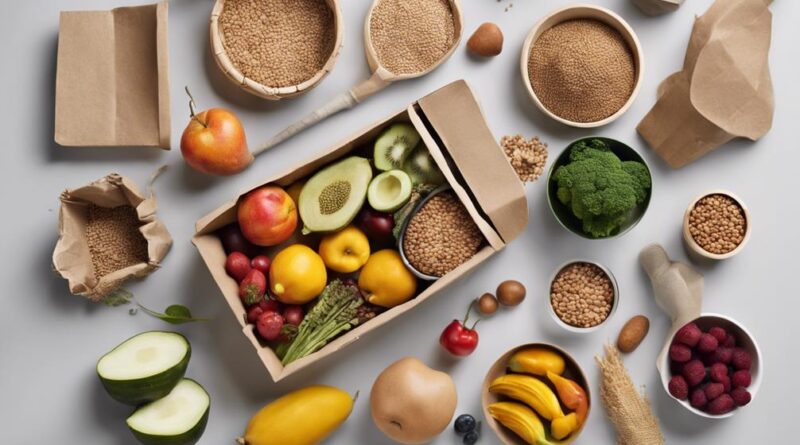What Makes Biodegradable Packaging Ideal for Health Foods?
Embracing biodegradable packaging for health foods brings numerous benefits. It reduces plastic waste, curbing marine pollution and aligning with eco-friendly principles. By minimizing harmful chemicals and preserving food quality, it safeguards your well-being and satisfies consumer preferences for sustainable products. Sustainable packaging solutions lessen environmental impact, foster resource conservation, and enhance brand image, offering economic advantages. Biodegradable packaging regulations ensure environmental sustainability and meet consumer demand for eco-friendly items, appealing to environmentally conscious consumers. These advantages reflect a commitment to sustainability, differentiate products, and build trust with environmentally aware customers. Discover more advantages by exploring further.
Environmental Benefits of Biodegradable Packaging
When considering the environmental benefits of biodegradable packaging, it's essential to understand its positive impact on reducing plastic waste. Biodegradable packaging helps in addressing the critical issue of marine pollution. Plastics used in traditional packaging often end up in oceans, harming marine life and ecosystems. By switching to biodegradable materials, you contribute to reducing the amount of plastic waste that finds its way into our oceans, thus safeguarding marine environments.
Moreover, biodegradable packaging aligns with the principles of the circular economy. In a circular economy, resources are used sustainably, and waste is minimized through recycling, reuse, and biodegradation. Biodegradable packaging plays a vital role in this system as it can decompose naturally, reducing the burden on landfills and the environment. By choosing biodegradable materials for packaging health foods, you actively participate in the transition towards a more sustainable and eco-friendly way of doing business.
Health Benefits of Using Biodegradable Materials
Using biodegradable materials for packaging health foods enhances consumer well-being by reducing exposure to harmful chemicals commonly found in traditional packaging. Biodegradable packaging offers significant health benefits by eliminating the risk of chemical leaching into food products. Sustainable materials like bioplastics derived from renewable resources such as corn starch, sugarcane, or cellulose provide a safer alternative to conventional packaging materials like polystyrene or PVC, which may contain toxic substances like phthalates and bisphenol A (BPA). These harmful chemicals can migrate from the packaging into the food, posing potential health risks to consumers.
Furthermore, biodegradable packaging helps maintain the nutritional quality of health foods by preventing contamination from external sources. By using packaging materials that break down naturally into non-toxic components, the risk of food contamination with harmful substances is significantly reduced. This preservation of food quality contributes to the overall wellness advantages associated with consuming health foods.
Incorporating biodegradable packaging in the health food industry aligns with the growing consumer demand for sustainable and eco-friendly products. Choosing biodegradable materials not only benefits personal health but also supports environmental conservation efforts. By opting for biodegradable packaging, consumers can enjoy the health benefits of reduced chemical exposure while contributing to a more sustainable and healthier future for both themselves and the planet.
Importance of Sustainable Packaging Solutions
Sustainable packaging solutions play a crucial role in reducing environmental impact and promoting long-term resource conservation in the food industry. As market demand for environmentally friendly products rises, the importance of sustainable solutions in packaging becomes increasingly evident. Consumer awareness about the environmental impact of packaging materials has grown, leading to a shift towards more sustainable options. This shift is driving packaging innovation towards materials that are biodegradable, recyclable, or compostable.
In response to this demand, businesses are embracing sustainable packaging solutions to not only meet consumer expectations but also to reduce their carbon footprint. Companies that adopt sustainable practices in packaging can enhance their brand image, attract environmentally conscious consumers, and contribute to a healthier planet. Sustainable packaging solutions not only benefit the environment but also provide economic advantages in the long run by reducing waste disposal costs and improving overall operational efficiency.
Furthermore, the use of sustainable packaging solutions can help mitigate the negative effects of traditional packaging materials on ecosystems and wildlife. By choosing materials that are renewable and biodegradable, businesses can minimize their environmental impact and contribute to a more sustainable future. In conclusion, the importance of sustainable packaging solutions can't be overstated in today's food industry, where consumer preferences and environmental concerns are driving significant changes in packaging practices.
Biodegradable Packaging Regulations for Health Foods
Biodegradable packaging regulations for health foods are imperative for ensuring environmental sustainability and promoting eco-friendly practices within the food industry. Regulatory compliance plays a significant role in shaping the use of biodegradable packaging for health foods. These regulations set standards for materials used in packaging, ensuring they meet specific criteria for biodegradability and compostability. By adhering to these standards, companies can guarantee that their packaging aligns with environmentally friendly practices, meeting consumer preferences for sustainable products.
Consumer preferences are a driving force behind the push for biodegradable packaging in the health food sector. As more consumers become aware of the environmental impact of traditional plastic packaging, there's a growing demand for sustainable alternatives. Biodegradable packaging offers a solution that resonates with environmentally conscious consumers, aligning with their values and preferences for eco-friendly products. Companies that prioritize biodegradable packaging not only meet regulatory requirements but also appeal to a broader customer base seeking sustainable options.
Enhancing Brand Image With Eco-Friendly Packaging
Enhance your brand image by adopting eco-friendly packaging practices that resonate with environmentally conscious consumers and align with sustainable values. Eco conscious marketing and sustainable branding have become key factors in consumer purchasing decisions, especially in the health food industry where customers prioritize health and environmental impact. By choosing biodegradable packaging for your health foods, you can showcase your commitment to sustainability and attract a growing market segment that values eco-friendly practices.
Eco conscious marketing strategies emphasize the importance of transparent communication about your brand's environmental initiatives. Highlighting your use of biodegradable packaging materials can create a positive perception among consumers who are increasingly looking for sustainable options. By incorporating sustainability into your branding, you can differentiate your products in a competitive market and build trust with environmentally aware customers.
Sustainable branding goes beyond just the product itself; it extends to every aspect of your business, including packaging. Biodegradable packaging not only reduces plastic waste but also demonstrates your brand's dedication to reducing its environmental footprint. This commitment to sustainability can help you connect with consumers on a deeper level and foster loyalty among those who prioritize eco-friendly practices. Embracing eco-friendly packaging isn't just a trend but a strategic decision that can enhance your brand image and resonate with the values of conscious consumers.
Biodegradable Options for Fresh Produce Packaging
To explore sustainable packaging options for fresh produce, consider the benefits of utilizing biodegradable materials that align with your health food brand's eco-conscious values. Reducing waste in the packaging of fresh produce is crucial for environmentally conscious consumers. Biodegradable packaging offers sustainable solutions that cater to the growing demand for eco-friendly options in the food industry.
When it comes to fresh produce, traditional packaging methods often contribute to significant amounts of non-biodegradable waste. By opting for biodegradable alternatives, you can reduce the environmental impact of your packaging. Materials such as compostable plant-based plastics, molded fiber trays, and biodegradable films provide eco-friendly options that align with the values of health-conscious consumers.
Biodegradable packaging for fresh produce not only helps in reducing waste but also showcases your commitment to sustainability. These options break down naturally over time, minimizing the burden on landfills and oceans. By choosing biodegradable materials, you demonstrate your dedication to preserving the environment and promoting a greener future for the food industry.
Incorporating biodegradable options into your fresh produce packaging not only benefits the environment but also enhances your brand's reputation as a socially responsible entity. Make the switch to biodegradable packaging to show your customers that you prioritize sustainability and are actively taking steps to reduce waste in your packaging practices.
Advantages of Compostable Packaging for Organics

When considering sustainable packaging options for organics, utilizing compostable materials can significantly reduce environmental impact and cater to the eco-conscious preferences of consumers. Compostable packaging offers several advantages for organics, making it an ideal choice for businesses looking to enhance their environmental stewardship.
Compostable packaging materials, derived from renewable resources such as plant-based polymers, break down into organic matter when composted. This process not only reduces waste sent to landfills but also contributes to soil fertility. When these materials decompose, they enrich the soil with essential nutrients, promoting healthier plant growth and reducing the need for chemical fertilizers. By choosing compostable packaging for organics, businesses can support sustainable agricultural practices that benefit both the environment and crop productivity.
Moreover, compostable packaging plays a crucial role in waste reduction. Unlike traditional plastics that can take hundreds of years to degrade, compostable materials break down efficiently in composting facilities, diverting organic waste from landfills. This not only minimizes the environmental impact of packaging but also helps to address the growing issue of waste management. Consumers increasingly value brands that prioritize sustainability, and compostable packaging for organics aligns with their desire for eco-friendly solutions. Embracing compostable packaging can set businesses apart in a competitive market while contributing to a more sustainable future for the planet.
Future Trends in Organic Food Packaging
With advancements in sustainable technology and consumer demand for eco-friendly solutions on the rise, organic food packaging is evolving towards innovative and biodegradable materials. Packaging innovation in the organic food industry is being driven by the need for more sustainable practices that align with consumer preferences for environmentally friendly products. As consumers become increasingly conscious of the impact of packaging on the environment, the demand for eco-friendly solutions continues to grow.
One of the future trends in organic food packaging is the development of compostable packaging materials made from renewable resources such as plant-based plastics, algae-based films, and mushroom packaging. These materials offer a more sustainable alternative to traditional plastic packaging, as they can break down naturally without leaving harmful residues in the environment.
Furthermore, consumer preferences are shaping the future of organic food packaging by emphasizing the importance of transparency, convenience, and sustainability. Brands are responding to these preferences by adopting packaging designs that clearly communicate the product's organic credentials, provide easy-to-use features, and use materials that have minimal impact on the environment.
Conclusion
In conclusion, biodegradable packaging is the ideal choice for health foods due to its environmental benefits, health advantages, and ability to enhance brand image.
With the importance of sustainable packaging solutions growing, regulations for biodegradable packaging are becoming more prevalent in the health food industry.
By opting for compostable options for fresh produce and organics, businesses can align with consumer preferences and promote a more eco-friendly approach to packaging.
The future of organic food packaging lies in innovative, sustainable solutions.
